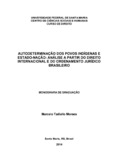| dc.contributor.advisor | Redin, Giuliana | |
| dc.creator | Moraes, Marcelo Tadiello | |
| dc.date.accessioned | 2017-08-21T17:07:33Z | |
| dc.date.available | 2017-08-21T17:07:33Z | |
| dc.date.issued | 2014-12-02 | |
| dc.date.submitted | 2014 | |
| dc.identifier.uri | http://repositorio.ufsm.br/handle/1/11495 | |
| dc.description | Trabalho de conclusão de curso (graduação) - Universidade Federal de Santa Maria, Centro de Ciências Sociais e Humanas, Curso de Direito, RS, 2014. | por |
| dc.description.abstract | The present paper has as its objective to analyze the evolution of the concept of the right to self-determination of peoples until its recognition to indigenous peoples, as well as to identify which are the existing parameters to its exercise on the Brazilian legal system. It starts with an analysis of the right to self-determination in its traditional conception, associated to territories under the trusteeship regimen, taking to the enlargement of the conception to cover the still existing colonies after World War II and, most recently, the existing ethnic minorities in a multiethnic State, context in which are inserted the indigenous peoples. By analyzing the aspects of the right to self-determination, it is shown that the right of indigenous peoples is associated mainly to the ideals of autonomy and self-government, expressed on the United Nations Declaration on the Rights of Indigenous Peoples, that doesn’t lead, at first, to the right of secession. By this way, it is shown that the effective respect to selfdetermination of those peoples depends on the existence of parameters on the legal system of each State that make possible its exercise. It is taken, then, to an analysis of the Brazilian legal system since the colonial age, trying to identify remote antecedents that have represented a drawing of the right to self-determination of those peoples. At last, it is identified as internal correspondents to the right of selfdetermination the originary rights over the occupied lands and the State’s duty on consulting the peoples before the adoption of measures that might affect them, making a brief analysis on specific cases associated to those rights to identify if there is an effective respect on the part of the Brazilian State. | eng |
| dc.language | por | por |
| dc.publisher | Universidade Federal de Santa Maria | por |
| dc.rights | Acesso Aberto | por |
| dc.subject | Autodeterminação | por |
| dc.subject | Povos indígenas | por |
| dc.subject | Direito internacional | por |
| dc.subject | Direitos humanos | por |
| dc.subject | Legislação brasileira | por |
| dc.subject | Self-determination | por |
| dc.subject | Indigenous peoples | por |
| dc.subject | International law | por |
| dc.subject | Human rights | por |
| dc.subject | Brazilian legal system | por |
| dc.title | Autodeterminação dos povos indígenas e Estado-Nação: análise a partir do direito internacional e do ordenamento jurídico brasileiro | por |
| dc.title.alternative | Self-determination of indigenous peoples and Nation-State: analysis from the international law and the brazilian legal system | eng |
| dc.type | Trabalho de Conclusão de Curso de Graduação | por |
| dc.degree.local | Santa Maria, RS, Brasil | por |
| dc.degree.graduation | Direito | por |
| dc.description.resumo | O presente trabalho tem por objetivo analisar a evolução do conceito do direito à
autodeterminação dos povos até o seu reconhecimento aos povos indígenas, bem
como identificar quais são os parâmetros existentes para o seu exercício no
ordenamento jurídico brasileiro. Partindo de uma análise do direito à
autodeterminação em sua concepção tradicional, associada a territórios sob regime
de tutela, passa-se pela ampliação do conceito para abranger as colônias ainda
existentes após a Segunda Guerra Mundial e, posteriormente, as minorias étnicas
existentes em Estados multiétnicos, contexto no qual se inserem os indígenas. Ao
analisar os aspectos do direito à autodeterminação, vislumbra-se que o direito dos
povos indígenas está associado fundamentalmente às ideias de autonomia ou
autogoverno, expressamente previstas na Declaração das Nações Unidas Sobre os
Direitos dos Povos Indígenas, não importando inicialmente no direito de secessão.
Assim, evidencia-se que o efetivo respeito à autodeterminação desses povos
depende da existência de parâmetros no âmbito interno de cada Estado que
viabilizem o seu exercício. Passa-se, então, a uma análise da legislação brasileira
desde o período colonial, buscando identificar antecedentes remotos que
representaram um esboço do direito de autodeterminação desses povos.
Finalmente, são identificados como correspondentes internos do direito de
autodeterminação o direito originário sobre as terras ocupadas e o dever do Estado
de consultar os povos antes da adoção de medidas que possam afetá-los, fazendose
uma breve análise de casos concretos associados a esses direitos a fim de
identificar se há efetivo respeito por parte do Estado brasileiro. | por |
| dc.publisher.country | Brasil | por |
| dc.publisher.initials | UFSM | por |
| dc.subject.cnpq | CNPQ::CIENCIAS SOCIAIS APLICADAS::DIREITO | por |
| dc.publisher.unidade | Centro de Ciências Sociais e Humanas | por |


